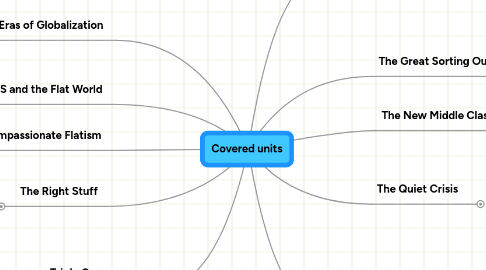
1. Eras of Globalization
1.1. 1.0, 2.0, 3.0
1.1.1. "1.0" lasted from 1492 til around the 1800's
1.1.1.1. 1.0 was most about the countries developing
1.1.2. "2.0" lasted roughly from 1800 - 2000.
1.1.2.1. 2.0 was most about the big business corporations that controlled everything.
1.1.3. "3.0" lasted from 2000 - current.
1.1.3.1. 3.0 was all about the development of the individual.
2. Triple Convergence
2.1. 3 different things that are making the world a more flatter playing field.
2.1.1. The ability of machines to efficiently run more than 1 single process at a time.
2.1.2. Businesses need to stat creating "horizontally" to create new value and innovation
2.1.3. The fall of the Berlin wall, many countries that followed the Soviet economic model, began to open up their economies.
3. US and the Flat World
3.1. The world is flattening, and unfortunately for us, the rest of the world is globalizing as well.
3.2. The US may not be the top world power. this could be fairly soon
4. The Right Stuff
4.1. There is an educational requirement that has come around in order to survive in the flat world.
4.1.1. Skills that cannot be duplicated by a computer will be important in the later coming years.
5. Compassionate Flatism
5.1. Thomas Friedman questions us; who will lead us into the forefront of this new globalized economy?
5.1.1. Without a proper leader, we will be in no way prepared for the flattening world.
6. Globalization
6.1. This explains how the current world is shifting to a new world where the US will not be the worlds central power, but more likely India or China
6.1.1. The US isn't exactly comfortable with knowing this fact.
6.2. regional economies, societies, and cultures have become integrated through a globe-spanning network of communication and trade
7. Causes of Globalization
7.1. outsoucreing, insourceing, offshoreing, in forming, steroids, supply chains
7.2. A lot of things have caused it, the changing of economies, the many different gaps such as: motivation, funding, education, and many others.
8. The Great Sorting Out
8.1. "Explains how countries and societies will adapt to the dramatic changes that globalization would bring from business to individual identities"
8.1.1. The traditional roles of consumer, employee, citizen, taxpayer and shareholder have all become blurred and intertwined.
8.2. Jobs are being taken from America, and placed into countries like India or China for cheaper labor.
9. The Quiet Crisis
9.1. A lot of higher education jobs like scientists are retiring, and there are not enough younger americans going into these fields.
9.2. If this is not changed, there will be a massive decrease in technological advancements in our nation.
9.2.1. After this happens for years, the US may be behind in innovation and technologies.
10. The New Middle Class
10.1. Among the middle class, there is a smaller class known as the "untouchables"
10.1.1. Plummers, Divorce lawyers, peoples job that will always be in demand
